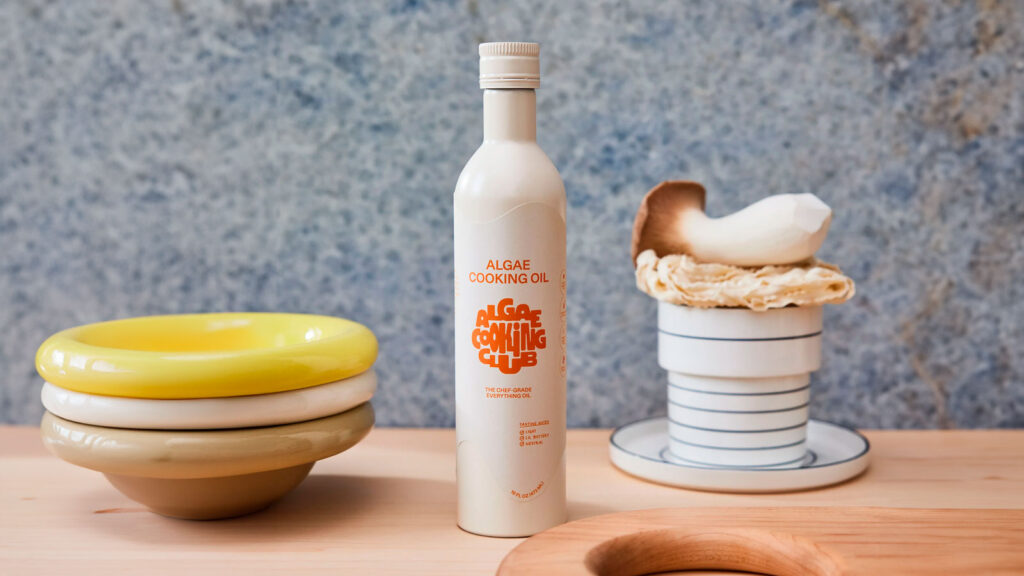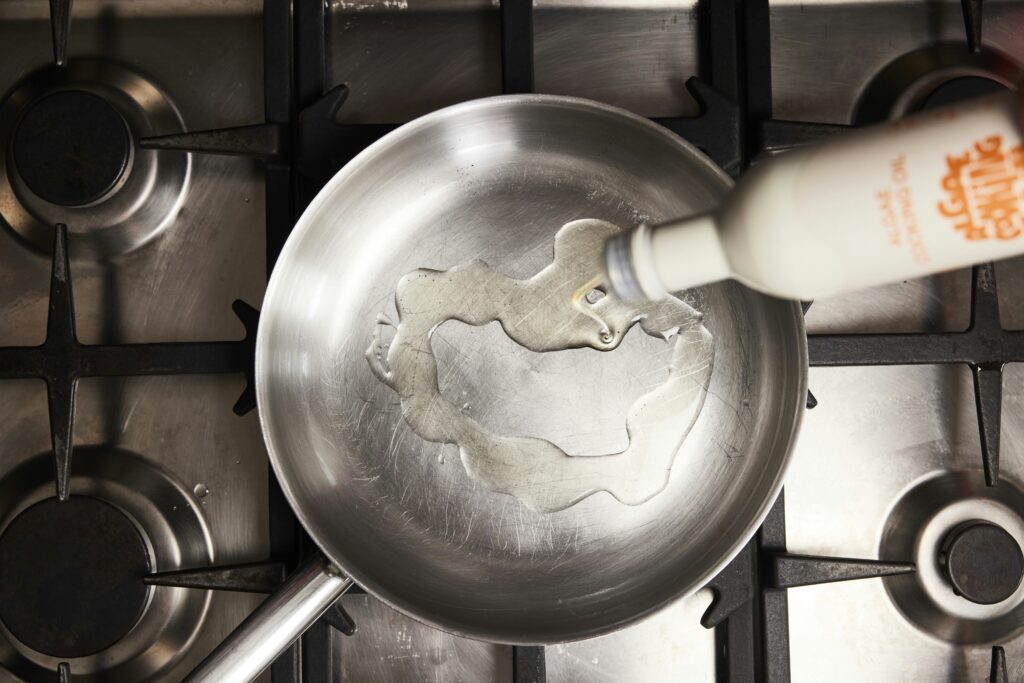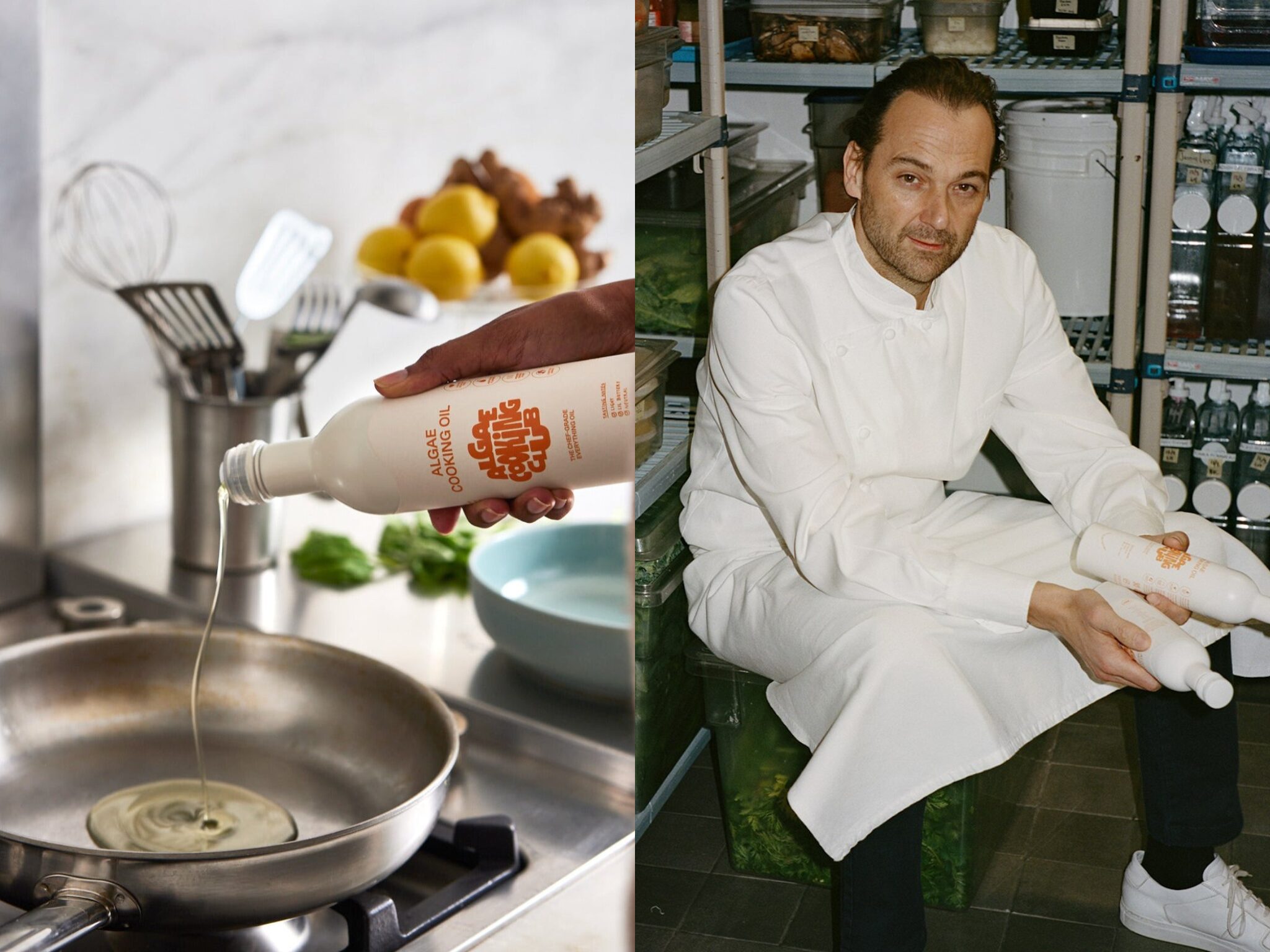Can Microalgae Change the Way You Use Fat Forever? This Michelin-Starred Chef Thinks So
5 Mins Read
With seed oils on the back burner and olive oil questioned for its climate impact, one company is banking on microalgae, and to convince you, it has sought the help of a three-Michelin-starred chef.
We’re having a fat moment. People are developing newer oils with novel ingredients that are better for you and the planet, in a bunch of different ways. Some are literally using air, others yeast, and yet others leveraging produce scraps.
Now, it’s time for algae. Soon to launch in the US, Algae Cooking Club will introduce the only algal oil on the market (and the second-ever). And there’s one common thread running among all the oils mentioned here: fermentation. The Delaware-based brand uses the same process you brew beer with, but instead of adding yeast to wort, it adds sugar to microalgae.
The result is a neutral oil high in smoke point (535°F/280°C), omega-9 fatty acids and sustainability credentials. But it’s not really the health and planet-friendliness that the brand wants to promote – for Algae Cooking Club, it’s the taste, the ‘chef-led’ aspect.
And who better to do that with than Daniel Humm, who sits atop the highest of echelons in the culinary world and has always been the talk of the culinary world – but even more so since his famous decision to turn his three-Michelin-starred restaurant Eleven Madison Park mostly vegan in 2021. Humm has hummed about sustainability and lower-impact cooking even more since then, and has duly signed on as Club Culinary Officer for the algae oil brand.
The climate and health aspects of microalgae

Founded in April 2023, Algae Cooking Club works with a manufacturer in Brazil, which ferments microalgae to produce the fat. Using sugar as a feedstock, the algae grows in bioreactors, which means the company doesn’t need to harvest algae from natural habitats. In just three days, oil makes up 80% of the algae’s content by weight.
This then undergoes an expeller pressing process, which is similar to how you’d squeeze olives for oil, separating the fat from the biomass. The rapid process makes the oil very suitable for industrial-level scalability. The result is a light, neutral oil with a hint of a buttery note, and a rich, rounded, non-greasy mouthfeel. “Slight buttery, hazelnut bouquet at the end,” describes the company.
There are multi-pronged benefits presented by Algae Cooking Club’s oil. First, there’s the sustainability aspect. The company’s own life-cycle assessment (LCA) has shown that algae have roughly half the carbon emissions of avocado, canola or olive oil, while it used an LCA carried out by TerraVia (formerly Solazyme) – the first company to produce algae oil under the Thrive brand, which has since discontinued – to reveal that algae oils over 250 times less water than olive oil, and that one hectare of land can produce over 12 times more of the former than the latter.
In fact, cooking oil crops are among the biggest drivers of deforestation globally, while climate change effects have driven prices up – olive oil is twice as expensive as it was a year ago. Algae Cooking Club’s oil is also packaged in what it says is an infinitely recyclable aluminium bottle, but there are no functional compromises here: the company has included an insert in the bottle to enable a controlled pour.
Then there’s the health credentials. Microalgae are known to produce heart-healthy fats, and this oil has a high density of omega-9 fatty acids (93%). This is much higher when you compare it to olive or avocado oil, whose omega-9 composition is around 70%. Plus, the algae oil contains 75% less saturated fat and only a fraction of the omega-6 fats, which contain linoleic acid, a compound linked to increased inflammation.
This is also why many restaurants are ditching seed oils, which have developed a bad rep due to their environmental and nutritional fallacies. These include Sweetgreen, Hopdoddy and Shake Shack, the latter two of which use Zero Acre’s Cultured Oil, made from fermented sugarcane
Daniel Humm steps up for algae oil

But perhaps the most important benefit – at least from Algae Cooking Club’s perspective – is the flavour and performance of the microalgae oil. There’s the smoke point, which is higher than olive and avocado oils, allowing people to cook food at high temperatures without imparting burnt or off notes.
Then there’s the flavour clarity: algae oil feels like an oil, but one designed to lift the flavour of the dish, instead of adding its own flavour to it. Food writer Andrea Hernández describes it best: “Algae Cooking Club oil served as an enhancer that was like playing a magic trick on your tongue, I know there’s oil on here, but somehow it just felt like a taste booster, nothingness and richness all in one.“
The omega-9 concentration means the oil is ideal for plant-based dishes, where it can act as a fat that can enhance flavour. The algae oil is also said to excel in emulsions and can be used to make fluffier dips, brighter dressings, and extra-creamy smoothies (given that fats help with nutrient absorption).
Algae Cooking Club swears by the fat’s versatility, claiming that its applications in stir-frying, baking, searing and lighter frying all make it a “chef-grade” oil. It’s why the company tapped Humm, which founder Kasra Saidi says validates the product. “I don’t know if people are going to bite on algae,” he told Fast Company, nodding to its associations with toxicity and perceptions about fishy flavours.
Humm, for his part, loves the fat, noting that it “totally aligns with my values of the pivot with the restaurant, [and] being more thoughtful”. He has been experimenting with it in chilli crisps, herby pestos as well as infused oils. “Because it’s so clean, you can become quite specific about what the flavour is,” he says.
The oil is already available online and will launch at Thrive Market, The Goods Mart and other boutique stores later this month. A 16oz bottle is priced at $25 (Zero Acre Farms’ 16 oz bottle costs $26.99) – which isn’t cheap per se, but cheaper than premium extra virgin olive oils. But that shouldn’t be a barrier for consumers, claims Humm, because it’s the only oil you’ll ever need: “People will realise that they now don’t need five different oils.”




